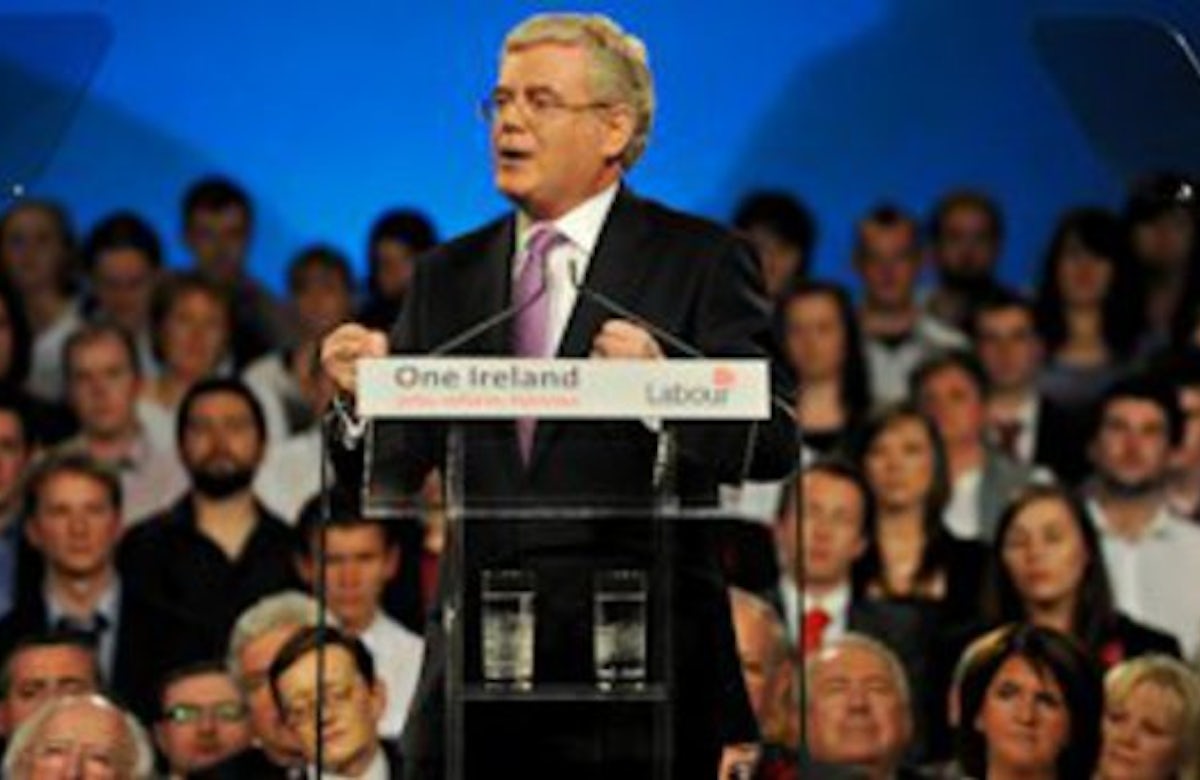 The head of the World Jewish Congress has reacted with dismay at the suggestion by Ireland's Deputy Prime Minister and Foreign Minister Eamon Gilmore (pictured left) last week to impose a European Union import ban on products made in Israeli communities in the disputed West Bank, which Gilmore said were “illegal” and made peace between Israel and the Palestinians “impossible”. Ronald S. Lauder said in reaction: “Such boycott calls are cynical and hypocritical. Minister Gilmore is taking aim at the only liberal democracy in the Middle East while keeping quiet about those who really wreak havoc in the region: the Assads, Ahmadinejads and their allies Hezbollah and Hamas.” Lauder added that “the West Bank territories are legally disputed and not illegally occupied.”
The head of the World Jewish Congress has reacted with dismay at the suggestion by Ireland's Deputy Prime Minister and Foreign Minister Eamon Gilmore (pictured left) last week to impose a European Union import ban on products made in Israeli communities in the disputed West Bank, which Gilmore said were “illegal” and made peace between Israel and the Palestinians “impossible”. Ronald S. Lauder said in reaction: “Such boycott calls are cynical and hypocritical. Minister Gilmore is taking aim at the only liberal democracy in the Middle East while keeping quiet about those who really wreak havoc in the region: the Assads, Ahmadinejads and their allies Hezbollah and Hamas.” Lauder added that “the West Bank territories are legally disputed and not illegally occupied.”
Speaking on behalf of the Irish government last week, Gilmore had said that settlements in the West Bank were "making the achievement of a two-state solution in the Middle East impossible. If there isn't a change in Israeli policy in relation to settlements in particular, I think we may have to look at some additional measures. I think we may have to look at the question of banning products from settlement areas into the EU. We have always resisted the idea of boycotts in relation to Israel. But I think a distinction has to be drawn here between Israel and the settlements," he said, adding that the Irish presidency of the European Union from January to June 2013 would take up the matter .
“Minister Gilmore’s remarks show that some European leaders would like to see Israel being coerced into making unilateral concessions,” the WJC president said. Lauder highlighted the fact that Israelis and Palestinians had both signed binding agreements for contentious issues such as settlements and borders to be decided in a final status peace agreement. Israel’s continued presence in what is called Area C of the West Bank, pending the outcome of permanent status negotiations, enjoyed the official sanction of the PLO, Lauder pointed out. He said it was therefore grossly misleading to constantly refer to Israeli settlements as being located in the ‘Occupied Palestinian Territories’. “Neither the United Nations nor the European Union have ever legally demarcated what will be part of the Palestinian state and what will be part of Israel. Nor should they: The final borders must be negotiated by the two parties concerned.”
The Irish human righst activist Barry Williams said that singling out Israel would "not secure a lasting peace". He has drafted a petition which, according to the 'Jewish Chronicle' in London, reads: "If Gilmore wishes to seek a boycott of Israeli settlement goods, we seek [an] EU wide boycott of Moroccan goods made in occupied Western Sahara and Indonesian goods made in West Papua New Guinea. We urge the minister not to seek a boycott of Israeli goods, instead he should look to build bridges between various communities in the Middle East."
 WJC President Ronald Lauder also criticized plans by several countries including South Africa and Denmark for the special labeling of Israeli products made in the West Bank. He said this would adversely affect thousands of Palestinian workers employed by Israeli manufacturers in the area. “Instead of encouraging economic cooperation, certain governments seem eager to jump on the bandwagon of the global anti-Israel movement in an effort to pander to their electorates. However, they should realize that by doing so, they are making things worse, not better,” Lauder declared.
WJC President Ronald Lauder also criticized plans by several countries including South Africa and Denmark for the special labeling of Israeli products made in the West Bank. He said this would adversely affect thousands of Palestinian workers employed by Israeli manufacturers in the area. “Instead of encouraging economic cooperation, certain governments seem eager to jump on the bandwagon of the global anti-Israel movement in an effort to pander to their electorates. However, they should realize that by doing so, they are making things worse, not better,” Lauder declared.






